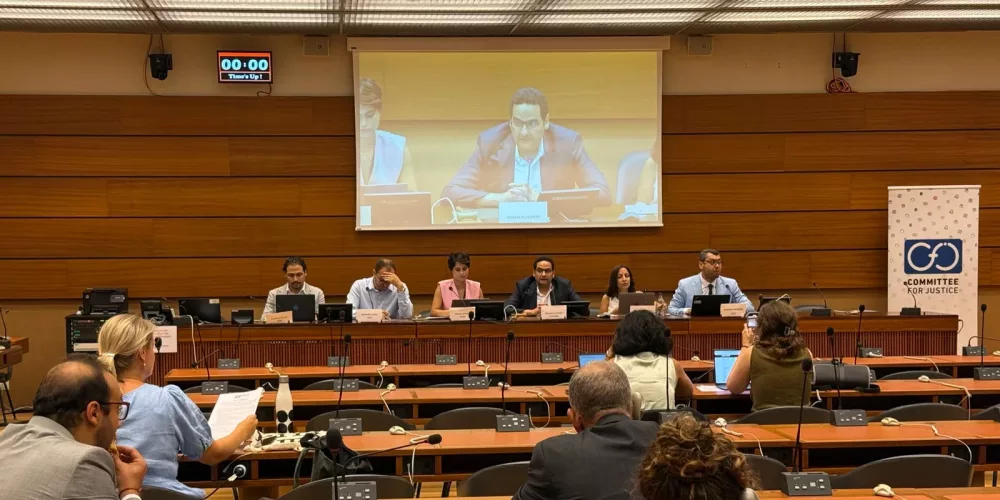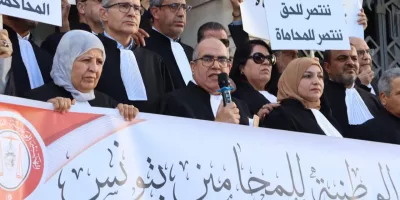The Committee for Justice (CFJ) organized a side event titled “From Recommendations to Reality: Monitoring Egypt’s Human Rights Commitments,” on Tuesday, July 2, 2025, on the sidelines of the 59th session of the United Nations Human Rights Council.
This event came amid rising concerns regarding the seriousness of the Egyptian authorities’ response to international recommendations aimed at improving the human rights situation within the country.
– El Fegiery: Need for International Coordination to Monitor Egypt’s Implementation of Recommendations
In his opening remarks, Moataz Al-Fajiri from the Euro-Med Human Rights, emphasized that the Egyptian government’s official responses to Universal Periodic Review (UPR) recommendations reflect a defensive and justifying approach, indicating a lack of political will to carry out genuine human rights reforms. He pointed out that this attitude does not stem solely from internal dynamics but is also influenced by an international and regional environment that overlooks violations and weakens pressure on the Egyptian government.
Al-Fajiri criticized the international silence regarding the ongoing repression in Egypt, highlighting the European Union’s recent decision to provide financial assistance worth 4 billion euros without linking it to any conditions related to improving civil liberties or halting violations. He also condemned the European Commission’s proposal to classify Egypt as a “safe country of origin,” describing it as a stark contradiction to the reality faced by opposition figures, activists, and migrants both inside and outside the country.
He added that opportunities for meaningful change in Egypt’s human rights situation have been missed since 2023, including the national dialogue track and the presidential committee tasked with reforms—initiatives he described as superficial and ineffective in bringing about substantive change. He noted the continued tightening of repression through arbitrary legislation, shrinking public space, and declining independence of state institutions responsible for protecting human rights, such as the National Council for Human Rights, reflecting a legal environment hostile to basic freedoms.
– Mefreh: Egypt Has Emptied the UPR Mechanism of Its Substance
During his speech at the event, Ahmed Mefreh, Executive Director of the CFJ, clarified that the Egyptian authorities’ participation in the UPR process was not reflective of a genuine commitment to reforming the human rights situation in the country, but rather closer to a publicity effort aimed at improving its international image without taking concrete steps on the ground. He pointed out that Egypt accepted a large number of non-controversial and vague recommendations while rejecting or ignoring key recommendations addressing sensitive issues, such as abolishing the death penalty, ending torture, ensuring fair trials, and releasing political detainees.
Mefreh explained that more than 60 recommendations were merely “noted” by the Egyptian authorities—a diplomatic term for silent rejection—demonstrating their unwillingness to seriously address pressing human rights issues. He highlighted that some of the ignored recommendations include joining important international treaties, such as the Optional Protocol to the Convention Against Torture (OPCAT) and the International Convention for the Protection of All Persons from Enforced Disappearance, as well as investigating cases of deaths in detention centers. He affirmed that this approach shows that the government does not treat the UPR mechanism as a genuine tool for human rights improvement.
Additionally, Mefreh pointed out that other international efforts, such as technical support and training provided by the Office of the UN High Commissioner for Human Rights and Special Procedures, have not received a real response from the Egyptian side, particularly regarding judicial and security sector reforms, respect for fundamental freedoms, and civil society operations. Despite these efforts, the human rights situation in Egypt has not improved significantly; in fact, it has deteriorated in several areas, especially concerning basic freedoms such as freedom of opinion, expression, and peaceful assembly.
Mefreh also stressed that the continuation of the current situation undermines the credibility of the UPR process and weakens trust in the commitments made by Egyptian authorities in international forums. He emphasized that merely presenting or accepting recommendations formally is insufficient, and independent and transparent follow-up mechanisms are necessary to ensure the actual implementation of these recommendations. Government statements do not necessarily indicate genuine cooperation or intent to enact real reform.
He concluded by urging the international community to take urgent action to confront the worsening human rights crisis in Egypt, describing the situation as requiring the establishment of an independent international mechanism to monitor human rights developments in the country. He called for this mechanism to investigate grave violations and report regularly to the United Nations on Egypt’s compliance with its international obligations, stressing that it is time to take more serious and effective steps instead of relying only on appeals and technical support that have failed to bring about real change so far.
– Al-Husseiny: There Must Be a Protection Mechanism for Human Rights Defenders in Egypt
In her speech, Samar Al-Husseiny from the Egyptian Human Rights Forum warned of the escalating systematic repression against human rights defenders, both inside and outside Egypt. She noted that the Egyptian authorities are carrying out what she described as “coordinated repression” through a set of policies and measures targeting not only activists within the country but even those who have left the country and continue their work abroad—an indication of how violations extend beyond borders.
She referred to several alarming patterns in this context, including issuing politically motivated ex parte judgments and charges against activists residing abroad due to their peaceful activities, among them Bahaa El-Din Hassan and Hisham Eshamaoui.
She also stated that the Egyptian authorities deprive these activists of their legal existence by preventing access to essential official documents such as identity cards, passports, and birth and marriage certificates, describing this tactic as “practical erasure,” which strips them of their basic rights and prolongs refugee status and prevents return.
Furthermore, she added that there is deliberate legal suppression of activists, including freezing civil records, listing them on terrorism lists without evidence or due process, especially under broadly worded anti-terrorism laws. She noted that the new draft criminal procedure law would further worsen the situation by targeting human rights defenders and their families with arrests and harassment, along with the use of digital spyware and surveillance tools mostly imported from European companies.
Al-Husseiny concluded with a series of urgent demands addressed to the international community and the Egyptian government, including an end to all forms of arbitrary persecution against human rights defenders, journalists, and researchers; respecting the Egyptian Constitution, particularly Article 62 relating to freedom of movement; and repealing Law No. 149 of 2019, which restricts the work of civil society organizations. She called for the establishment of an independent judicial mechanism to challenge travel bans and arbitrary detentions, the dropping of charges and in absentia trials, and guaranteeing the right of return for exiled defenders without fear of retaliation or prosecution.
– Attallah: Egypt’s Anti-Terrorism Laws Are Used to Restrict Freedom of Press and Expression
For his part, Ahmed Attallah from the Egyptian Front for Human Rights confirmed during the event that Egyptian authorities continue to misuse anti-terrorism laws excessively, threatening basic freedoms, including the rights to expression, peaceful assembly, and political participation. He noted that these practices have been addressed in several recommendations presented to Egypt during the UPR, but the Egyptian authorities responded with reservations, stating that these laws are “necessary for protecting national security,” which he said serves as additional proof of the continuation of a repressive environment where counter-terrorism is used as a pretext for political repression.
Attallah explained that anti-terrorism laws, issued since 2015 and added to existing provisions in the Penal Code, were initially intended to combat terrorist threats but quickly became tools to target activists, opposition figures, journalists, and even ordinary citizens simply because they posted a critical opinion on Facebook or created satirical content on TikTok. He clarified that these laws grant broad powers to security and judicial bodies to accuse individuals of terrorist activities, leading to arbitrary arrests and prolonged pre-trial detention without trial.
He pointed out that thousands of citizens are currently imprisoned on terrorism-related charges, with their detention being repeatedly renewed before the State Security Prosecution and Terrorism Circuits, sometimes for years without an actual trial. He also mentioned the policy of “rotating defendants,” whereby new similar charges are filed to ensure continued detention. He affirmed that the reactivation of the Presidential Amnesty Committee has not led to significant improvements, as the number of released detainees did not exceed one-third of those arrested, despite over 6,000 political arrests in recent times.
Attallah concluded by calling for the repeal of vague anti-terrorism provisions in Egyptian law and for redefining the concept of terrorism more precisely and narrowly so that it cannot be used as a pretext to criminalize peaceful activism. He also demanded an end to arbitrary pre-trial detention, ensuring fair trials, and establishing an independent mechanism to investigate cases of torture and enforced disappearance and hold perpetrators accountable. He stressed that radical legislative reform of these laws is not optional but a necessary national and international obligation to stop daily violations, respect rights and freedoms, and build genuine social peace amidst the difficult circumstances facing the country.
– Lotfy: Egypt Refused Independent Prison Oversight Due to Numerous Violations Inside Prisons
Mohamed Lotfy from the Egyptian Commission for Rights and Freedoms emphasized during the event that the human rights situation in Egypt has shown no improvement since the previous UPR cycle. The Egyptian authorities have continued to violate the basic rights of citizens, particularly in places of detention, where the deaths of 13 people were recorded inside prisons during the first three months of 2025, including Mahmoud Asaad, who died after being tortured following his arrest along with his mother, in circumstances that highlight the ongoing pattern of repression and security retaliation.
Lotfy questioned the independence of oversight and judicial bodies in Egypt after repeated cases of deaths under torture went unpunished, citing the case of another young man named “Afroto,” who was killed in the same way ten years ago, demonstrating the persistence of impunity.
He also discussed the situation in Marsa Matrouh city, where a number of citizens were arrested after chasing a fugitive, resulting in the deaths of two young men in custody. He pointed out that the authorities arrested 23 women from a Bedouin tribe as leverage to obtain the suspects, then asked the victims’ families to collect their sons’ bodies without investigation or accountability, causing widespread anger among locals and shedding light on policies of revenge and systematic targeting of vulnerable groups.
In conclusion, Lotfy referred to the case of a young man named Muhammad Jamal (26 years old), who disappeared for ten days after participating in a solidarity demonstration with the Palestinian people, and was later referred to the State Security Prosecution on charges of “joining a terrorist group,” despite exercising his right to peaceful expression and assembly.
He stressed that these cases are not exceptions but true reflections of the nature of legislation and security performance in Egypt, calling on the international community not to rely solely on government statements and to take real action in supporting recommendations aimed at ending violations and stopping daily repressive policies.
–Acheck: There Is a Lack of Genuine Reform Regarding Women’s Rights in Egypt
In her speech at the event, Maisaa Ashq from the Cairo Institute for Human Rights Studies confirmed that the grave violations committed against women and girls in Egypt reveal a real gap between official commitments and the deteriorating reality. She emphasized that the tragic incident that occurred on June 27, 2025, which resulted in the death of 18 girls aged between 14 and 20 from marginalized economic backgrounds while working in seasonal agriculture for a daily wage not exceeding $3, without any legal protection or respect for basic labor rights, is the clearest example of this discrepancy.
Ashq mentioned that despite declaring national strategies such as the “National Plan for Gender Equality in the Labor Market,” the Egyptian authorities have not translated these into tangible actions that reflect the reality faced by women, especially in the informal sector. She noted that Egypt ranked among the ten worst countries globally in terms of gender equality according to the 2025 Global Gender Gap Report—a serious decline compared to its 135th position the previous year.
She explained that the Egyptian state has not supported a large number of key international recommendations submitted during the fourth UPR cycle and limited itself to merely noting them, including those related to joining international agreements such as ILO Convention 190, protecting the freedom of expression of activists, reforming discriminatory personal status laws, and addressing gender-based violence, including honor crimes and virginity testing.
Ashq condemned the Egyptian parliament’s failure to respond to a comprehensive bill to combat gender-based violence, despite being introduced by a coalition of five women’s organizations in collaboration with two female parliamentarians in consecutive sessions. Additionally, the new Personal Status Law, announced back in 2022, remains uncertain in fate to this day. She stressed the increasing rates of violence against women, including so-called “honor killings,” at a time when the authorities deny the existence of such crimes.
She concluded her speech by calling on the international community to continue pressuring the Egyptian authorities to improve women’s rights and implement necessary protective legislation. She emphasized that systemic discrimination and violence against women and LGBTQ+ individuals remain structural challenges requiring urgent and real intervention to halt the deteriorating equality crisis in Egypt.






